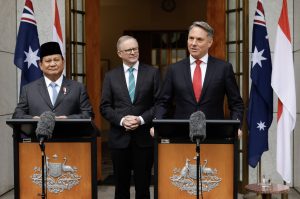Australia and Indonesia have agreed to a new defense cooperation agreement that will foster their security cooperation in an increasingly tense and constrained region, Australian Prime Minister Anthony Albanese said today.
Speaking alongside Indonesia’s President-elect Prabowo Subianto in Canberra on Tuesday, the Australian leader described the treaty-level security pact, which is set to be signed in the coming days, as “historic.”
“It will be a vital plank for our two countries to support each other’s security, which is vital to both countries, but also to the stability of the region that we share,” Albanese told a joint press conference in Canberra, Reuters reported.
Australia and Indonesia already engage in a considerable amount of security cooperation, and also work together to tackle non-traditional security threats including human trafficking and drug smuggling. Australia took part in the latest iteration of Indonesia’s Super Garuda Shield joint military exercises, alongside the United States, Japan, Singapore, France, and United Kingdom. The Royal Australian Air Force and the Indonesian Air Force also conducted joint maritime surveillance exercises in Bali in May, following an air combat training mission in North Sulawesi in September.
Although the full details of the agreement have not yet been released, the pact includes provisions for joint drills and – most importantly – reciprocal access by the Australian and Indonesian militaries to each other’s countries, which will help facilitate more substantial security cooperation.
This morning, Australian Defense Minister Richard Marles stated that the agreement was underpinned by the proximity of the two nations, who share one of the longest maritime borders in the world.
“The map really determines that Australia and Indonesia as the closest of neighbors have a shared destiny, but from this moment forth, that destiny is very much defined by deep strategic trust,” he said.
For his own part, Prabowo, who is currently serving as defense minister, said that he wanted to improve relations with Australia while following the “general policies” of President Joko “Jokowi” Widodo, whom he will succeed in October. According to the news agency AFP, Prabowo “singled out the need for Australian help in areas such as agriculture, food security and international drug trafficking.”
The defense agreement has been expected for some time. Back in February, Australia and Indonesia confirmed they were in negotiations to upgrade their 2012 defense pact to a binding treaty-level agreement.
The agreement marks the culmination of a history of defense cooperation that has been turbulent at times. In 1995, Foreign Minister Gareth Evans and his Indonesian counterpart Ali Alatas signed a landmark security agreement, but Jakarta abrogated the pact in September 1999, over Australia’s involvement in the East Timor crisis. While relations eventually recovered – new security agreements were signed in 2006 and 2012 – the relationship, much like the Australia-Indonesia as a whole, has been subject to periodic rifts and ruptures.
As ABC News noted in a recent article, these included the revelation in 2013 that Australia had wire-tapped of the phone of then-Indonesian President Susilo Bambang Yudhoyono, and a controversy over “offensive” training materials used by the Australian Army, which prompted Indonesia briefly to suspend military cooperation with Australia.
The new agreement suggests a maturing of the relationship, and the growing areas of overlap in the two sides’ strategic perceptions, particularly regarding the growing geopolitical turbulence stemming from China’s growing power and ambition. But the two nations continued to interpret and react to this challenge in quite different ways. Where Australia has responded by reaffirming its alliance with the U.S., effectively choosing a “side” in the growing strategic divide, Indonesia has continued to hew to the “free and active” non-aligned foreign policy that it has guided it since independence. This has seen the country’s leaders, guided overwhelmingly by domestic imperatives, particularly the need to promote economic growth, pursue good relations with nations of every political hue.
As such, the new agreement, like the growing defense cooperation between Indonesia and the U.S. is unlikely to nudge a new Indonesian administration off the fence. Just over two weeks ago, Prabowo visited Russia, where he described President Vladimir Putin as a “great friend” and pledged to deep relations with his government. This followed a state visit to China, his first overseas trip after winning a landslide victory at the presidential election in February. During a meeting with leader Xi Jinping, affirmed Jokowi’s “policy of friendship” with China.
































